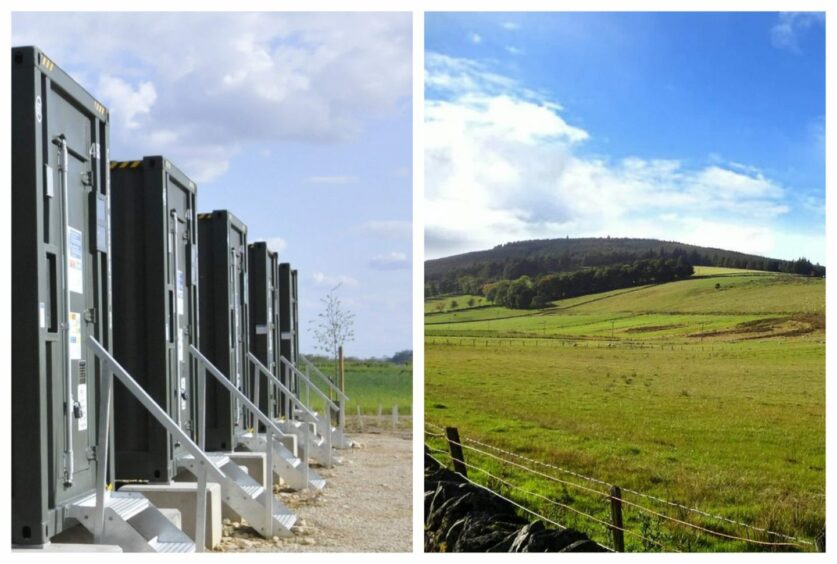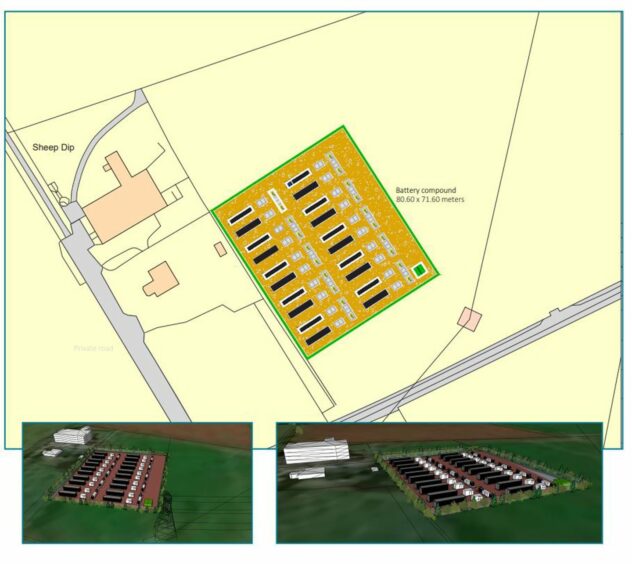
Fears over fire and pollution are being raised by a Highland community as developers plan a large battery project in Easter Ross.
Local residents have hit out over a lack of answers from developer Fig Power – a part of UK engineering group Hydrock – over a planned project at Swordale, near Evanton, comprising up to 20 battery container units.
While battery fires are rare, the 49.9-megawatt scheme is more than twice the capacity of an Orsted battery storage scheme in Liverpool which took first responders nearly 60 hours to bring under control when an explosion and blaze engulfed it in 2020.
Rachael Bews, a resident of Swordale, highlighted that despite the rarity, even one occurrence could place huge pressure on the remote community.
“There’s only one full-time fire unit in the area so the logistical challenges of putting out a fire at a unit like this here could be really challenging because of where we’re located,” she said.
Live updates as fire rips through Liverpool electrical unit https://t.co/V0jAatc790
— Liverpool Live (@LivEchoLive) September 15, 2020
“I do really understand the need for these innovations and I have no issue with them being here. It just seems from what I’ve read that there aren’t enough contingency plans in place to protect the environment if things do go wrong.”
Ms Bews and others are keen to understand what precautions would be put in place – particularly in a village with single-track road access.
Fig Power had no comment when asked by Energy Voice about residents’ concerns.
A presentation available via the company’s website says the development will not lead to a detrimental loss of agricultural land, and that the site will be screened to protect and enhance the visual impact, as well as providing “much needed tree planting”.
Fig also said a “comprehensive heritage appraisal” was undertaken in summer 2022 in which “no issues” were raised.
The site, including inverters and transformers will be linked to a substation at Fyrish, near Alness via a new three-mile buried cable.
Pollution fears
The developer says the scheme will be built on a flood-free zone, though another Swordale resident who lives near the proposed site and who wished to remain anonymous said he was more concerned about the potential for pollution should any incident occur.
“If those batteries fail and you need thousands of gallons to cool it…the water will be contaminated,” he told Energy Voice, noting that any fluid used would be almost impossible to contain and could then drain into surrounding water courses.
Both also flagged the potential noise pollution from systems used to cool the units.
“I’ve been in engineering all my life – there’s nothing that moves air quietly. The moment a fan is turning it’s not quiet. We have peace and quiet up here, it’s a brilliant place to stay, and the noise pollution from that will not be good,” he added.
He questioned why the facility could not be located closer to existing infrastructure at the Fyrish substation.
Proponents of the site reportedly suggested it could help provide residents with electricity in the event of a power cut – a not uncommon occurrence in rural Easter Ross.
However, Ms Bews dismissed the idea as “nonsensical”, given that most outages are caused by trees falling on overhead lines – something a local battery connection is unlikely to prevent.
Planning permissions
The Swordale project highlights the potential backlash against a wave of similar projects across Scotland and the UK, as Britain becomes more reliant on intermittent renewable energy sources.
This in part due to the nature of the planning framework. In Scotland, energy storage sites remain classed as “generating stations” – and as such any scheme greater than 50MW requires clearance from ministers.
Sites below this threshold – including the proposed development near Evanton – only require approval from local planning authorities.
A similar system applies in England and Wales, though a 2020 revision to planning laws means batteries above 50MW in England and 350MW in Wales may can now proceed without national planning approval.
Further changes could still be made. Conservative MP Maria Miller is currently pushing forward a bill that would see industrial lithium-ion battery sites categorised as “hazardous”, so that the Environment Agency, the Health and Safety Executive and the fire and rescue services would be statutory consultees when planning applications are considered.
However with curtailment payments to wind farms now totalling some £900m since 2017, more storage capacity and infrastructure will inevitably be needed.
In Swordale, the community may find itself at the sharp end of these debates.
Ms Bews said most people had learned of the proposals via “a tiny note through the door” in early January.
The flyer highlighted key details for the project and the hosting of two public meetings, with any public comments to be filed ahead of a 3 March deadline.
“Having spoken to some of the other residents, that is quite a short time frame for people to become clued up enough on what it is they’re proposing and to get fair and balanced information,” she said.
At least 40 people are expected to attend a community-organised meeting in the village hall this week, as “quite a large number of people I think have concerns about it,” she added.
Fig Power and its agents intend to hold a further public consultation meeting on the afternoon of 23 February 2023 at VDJ Hall in Evanton, during which residents can ask questions.
The earliest date for the formal submission of documents is 3 March 2023, though the developer said residents will have another opportunity to comment once a planning process is initiated with Highland Council.
Yet unless local concerns can be allayed, the project may not find a groundswell of support.
“To me this is a no-goer,” one local said.
“I don’t care how many they’re going to build, they’re only going to cause grief.”
 © Supplied by Fig Power
© Supplied by Fig Power